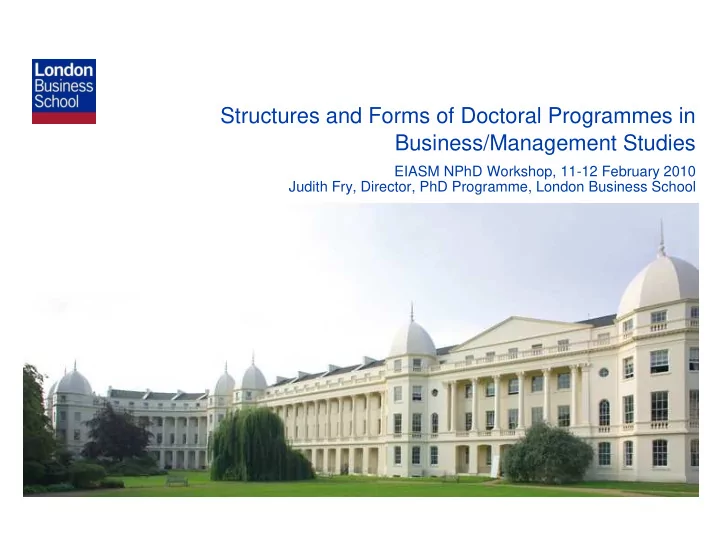

Structures and Forms of Doctoral Programmes in Business/Management Studies EIASM NPhD Workshop, 11-12 February 2010 Judith Fry, Director, PhD Programme, London Business School
Mission To educate excellent scholars who will be sought after as faculty in the world’s leading business schools, universities and research institutions.
Overview • 69 registered students • 23 nationalities • 46% women • Average GMAT score 709 (2009 admitted students) • 372 applicants for admission 2010 (18% increase over 2009) • Full funding (stipend and fee waiver) guaranteed for 4 years, subject to satisfactory academic performance • 15 new scholarships each year • Full-time only • 7 subject areas (98 core faculty): Accounting, Economics, Finance, Management Science and Operations, Marketing, Organisational Behaviour, Strategic and International Management • Programme takes 4-5 years to complete, including coursework
PhD Committee Membership PhD Programme Chair (currently Bruce Hardie, Professor of Marketing) PhD Coordinators for each subject area PhD Programme Director Two student representatives Terms of Reference To maintain the academic quality of the PhD Programme: • Oversee admissions • Approve transfer from MPhil to PhD status • Appoint thesis examiners • Guide policy and curriculum
PhD Programme Office 2.1 FTE Programme administrators (including the Director) • Process all applications • Marketing materials and website content • Timetabling • Maintain student records • Monitor student progress • Manage the thesis examination process • Pastoral care Located within the Academic Affairs Office, alongside Faculty HR functions and Research Support.
Coursework Students complete a minimum of 12 course credits, including the following: Programme Core Courses • Foundations of Business Research • Microeconomics • Statistics and/or Econometrics Subject Area Core Courses • 3-6 courses over a two year period Elective Courses • Chosen from another subject area • Advanced/specialised methodology courses 30 courses (900 hours) offered each year + courses at LSE, UCL and Imperial
Supervision Year 1 In most subject areas the PhD Coordinator acts as a mentor. Year 2 The student has selected a Supervisor who is an expert in his/her chosen topic. Years 3-5 Following successful examination by a Transfer Committee, this committee becomes the student’s Dissertation Committee. Transfer/Dissertation Committee • the Supervisor • another member of faculty from the same subject area • a member of faculty from a different subject area.
Programme Structure Year 1 Completion of 8-9 course credits Subject area field/ comprehensive exam Appointment of thesis supervisor Year 2 Completion of 3-4 course credits Research Paper (minimum grade required for progression to MPhil/PhD) Award of Master of Research degree Year 3 Transfer from MPhil to PhD by 1 April Dissertation Committee Years 4-5 Completion of thesis Examination by two independent examiners Preparation for job market
Student Support Cohort office for all 1 st year students with individual work stations • and new high-spec PC for each student Shared offices within subject areas from 2 nd year onwards • • Dedicated social space with newspapers, kitchen facilities, etc. • Funds for attending conferences • Generic skills training: Language, interviewing, presentation skills and intercultural workshops.
40 years on First students admitted in 1969 to a traditional British 3-year programme. Major review in 1996 led to significant changes: • Focus on academic mission • Full funding for all students • Full time only • Centralised and more rigorous admissions process • Introduction of formal coursework component. Changes over the past ten years: • Rigorous programme milestones, including award of the MRes at the end of Year 2, and a minimum level of performance in the Research Paper for progression to MPhil/PhD. • Continued expansion of the coursework component, focussing in particular on methodology and quantitative skills. • Introduction of Dissertation Committees. • Location of students within subject areas.
Challenges • High cost – High risk • Centralisation vs. Autonomy • One size doesn’t fit all • Stand-alone postgraduate business school • Supervisor training • Preparing students for their future role as teachers • Attracting candidates from the UK
Successes Around 80% of graduates obtain an academic placement. In recent years our placements have included • Cambridge (Economics) • Columbia (Marketing) • Darden (MSO) • Erasmus (Marketing) • Harvard (Marketing, OB) • INSEAD (Finance, Marketing, Strategy) • London School of Economics (Accounting, Finance) • Wharton (Strategy) • Yale (Finance)
Recommend
More recommend